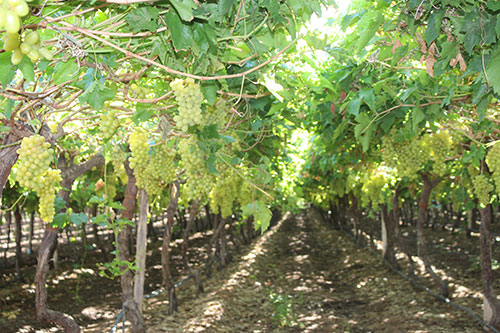OUTAPI - Over 1 000 people will be hired at the first grape farm at the Etunda Green Scheme later this year.
This was revealed by Omusati governor Erginus Endjala during his state of the region address on
Friday.
The Etunda project, which was in the past considered a beacon of hope for youth employment and food security in the country, has in recent years ground to a halt due to an array of
challenges.
The land of this irrigation scheme in the Omusati region is divided into two sections, catering for small-scale famers who are now claiming to be barely surviving, while the rest of the scheme belongs to the government.
There has been little production on the State’s portion of land for over a year.
However, Endjala said production has restarted at the facility.
In March last year, agriculture minister Calle Schlettwein spoke at the Dubai World Expo about government’s intention to lease Namibia’s green schemes through request for proposals (RFPs) to local and foreign investors by June and July this year.
The schemes used to be under the wings of the Agricultural Business Development (Agribusdev) agency, but government decided to liquidate the agency.
They are now under the ambit of the agriculture ministry.
Endjala indicated that inspections were conducted in security, energy/fuel, garage/transport, agriculture, construction, informal sectors, and the retail wholesale industries.
“It was noted that only agriculture, security, construction and home (domestic employees) sectors are subject to minimum wage regulations,” he said.
The Outapi labour offices have registered 718 female and 334 male job-seekers.
Therefore, there were 1 052 registered job applicants, but only 53 were hired.
“As part of job-creation, I hereby wish to invite you all to witness the first grape plantation farm at the Etunda Green Scheme, scheduled to take place on 20 September,” he enthused.
“The youth and young farmers are the future of Namibia’s agriculture and agri-food sector.
The government of Namibia recognises that their fresh ideas and approaches will help build a stronger, more innovative sector ready to meet the needs of tomorrow.
Young people are key to the success of this country’s agriculture sector. The future belongs to them. Through the participation of the government and other groups such as small-scale farmers, we are ensuring that their voice is heard and considered in our decisions. We also want to offer young people rewarding professional experiences that help to enhance the sector and address the labour shortage,” Endjala said.
The governor, who has always advocated for greater agricultural production, said it is his dream for the region to be a pioneer in agro-processing.
“I want to see more and more products on our shelves come from Omusati,” he continued.
Endjala said he is satisfied with the production of fresh produce in the region, and thus encourages farmers to produce more.
The governor observed that apart from creating food for the region and beyond, employment can also be created through agriculture.
Furthermore, Endjala revealed that an agreement was signed between the Namibian Agronomic Board and the University of Namibia (Unam) to carry out seed research and multiplication at several locations in the country.
The primary objective of the Ogongo campus is the production and selection of mahangu, maize and potato seed.
“Six distinct potato types, 60 white maize hybrids, and 24 different pearl millet (mahangu) variants were tested. The main goal is to establish a trustworthy local seed supply in Namibia to guarantee food security,” said Endjala.
Moreover, the campus has received a sponsorship of N$750 000 to support food production and for the education of young Namibians by Debmarine Namibia.
The funds were utilised to purchase supplies for poultry breeding activities and raising rice production.
The campus’s annual production of rice rose from four hectares to 10ha, totalling 25 tonnes, while the hatchery’s capacity increased to 30 000 chicks annually.
Academically, 341 students were enrolled in the Diploma in Agriculture and the BSc in Agriculture (crop science) programmes, which brought the students’ enrolment to 358.
Likewise, 23 students graduated with Natural Resources Management diplomas, and 11 students with BSc degrees.
-vkaapanda@nepc.com.na
Caption:


